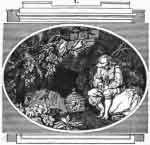A Fowler was injured and cried while killing birds. A young bird thought it was pity; an older set him straight.
Tears don’t always signify pity.

JBR Collection
A Fowler, in killing some birds which he had caught in his net, woundcd his hand by accident so severely that he shed tears through the anguish he suffered. “See,” says a young Bird, “he shows signs of pity for us.” “Don’t mind his tears,” said an old Bird, “but look at his bloody hands.”

Northcote
[Note: The Northcote fable is the same fable as in the JBR Collection above. Only the illustration and Application associated with the fable in the Northcote book are displayed here.]
Application
Innocence and a credulous facility expose a man to be both a prey and a laughing-stock at once; and the imposture can hardly miscarry, where there is a full confidence on the one side, and a plausible address on the other.
Prudent folks never trust those a second time who have deceived them once; and indeed we cannot be too cautious in following this rule, for upon examination we shall find that most of the misfortunes that befal us, arise from an excessive credulity. They who are anxious to guard against others, without exposing or hurting themselves, (till honesty comes to be more in fashion) can never be too suspicious.
It is a man’s actions we are to be governed by in our opinion of his character; as fair words may be untrue, and false impressions may deceive us. The tears from the eyes will not suffice to wash blood from the murderous hands. J. Northcote

Aves et Auceps Lippus
Dum harundines construit et spargit escam auceps, lippientibus et stillantibus oculis, aviculae, ita illum erga se animum gerere clementem et mansuetum ratae, advolant propius et aliquae visco inhaerentes capiuntur. Quas videntes reliquae aucupis morsu praefocari et in sportellam coniici, avolantes, “Heu quam fallaces lacrimae sunt istae,” inquiunt, “quae mortem attulere sociis nostris.”
Moral
Fabula monet ut caveamus, ne composita specie et ficta bonitate decipiamur.
Perry #576
